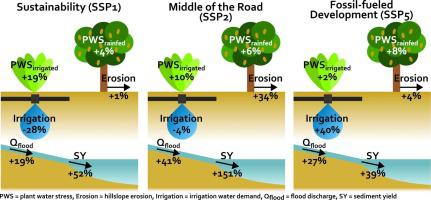当前位置:
X-MOL 学术
›
Agric. Water Manag.
›
论文详情
Our official English website, www.x-mol.net, welcomes your feedback! (Note: you will need to create a separate account there.)
How future changes in irrigation water supply and demand affect water security in a Mediterranean catchment
Agricultural Water Management ( IF 6.7 ) Pub Date : 2024-04-16 , DOI: 10.1016/j.agwat.2024.108818 J.P.C. Eekhout , I. Delsman , J.E.M. Baartman , M. van Eupen , C. van Haren , S. Contreras , J. Martínez-López , J. de Vente
Agricultural Water Management ( IF 6.7 ) Pub Date : 2024-04-16 , DOI: 10.1016/j.agwat.2024.108818 J.P.C. Eekhout , I. Delsman , J.E.M. Baartman , M. van Eupen , C. van Haren , S. Contreras , J. Martínez-López , J. de Vente

|
It is likely that climate change will increase irrigation water demand and, consequently, reduces water security in the Mediterranean Basin if current irrigation supply and demand conditions are maintained. Climate change adaptation can be achieved by (1) decreasing irrigation water demand through more efficient irrigation techniques, (2) increasing irrigation water supply by adopting new technological advances, (3) converting to rainfed agriculture, and (4) implementation of Nature-based Solutions for water retention. The aim of this study was to assess the effectiveness of different combinations of these adaptation options on water security through analysis of contrasting scenarios of socio-economic development. We defined plausible scenarios of climate change, land use change and adaptation measures for an intensively irrigated catchment in south-eastern Spain under three Shared Socioeconomic Pathways (SSP), representing different storylines of socio-economic development. We considered three SSP scenarios, including the Sustainability pathway (SSP1), the Middle of the Road pathway (SSP2) and the Fossil-fueled Development pathway (SSP5). Future land use distributions were obtained with the iClue land use change model by accounting for differences in irrigation water demand and supply, resulting in a decrease (SSP1), a constant (SSP2) and an increase (SSP5) in irrigated agriculture. The impact of each scenario on a series of water security indicators was quantified using the SPHY-MMF hydrology-soil erosion model. The SSP2 scenario, which considers very limited climate change adaptation, projects the most severe impacts on water security, including an increase in plant water stress, flood discharge, hillslope erosion and sediment yield. Under SSP1, which accounts for most climate change adaptation strategies, irrigation water demand is significantly reduced due to a shift from irrigated to rainfed agriculture and the implementation of reduced deficit irrigation, while Nature-based Solutions reduce the impact on other water security indicators. Under SSP5, a conversion from rainfed to irrigated agriculture causes a significant increase in irrigation water demand, which is met by increasing irrigation water supply from desalination. SSP5 shows intermediate impacts on other water security indicators, which is explained by a strong decrease in annual precipitation. This study helps exploring how different future socio-economic pathways affect water security and thereby supports evidence-based policy development.
中文翻译:

灌溉用水供需的未来变化如何影响地中海流域的水安全
如果维持目前的灌溉供需条件,气候变化可能会增加灌溉用水需求,从而降低地中海盆地的水安全。适应气候变化可以通过以下方式实现:(1) 通过更高效的灌溉技术减少灌溉用水需求,(2) 通过采用新技术进步增加灌溉用水供应,(3) 转向雨养农业,以及 (4) 实施基于自然的农业保水解决方案。本研究的目的是通过分析社会经济发展的对比情景,评估这些适应方案的不同组合对水安全的有效性。我们根据三个共享社会经济路径(SSP)定义了西班牙东南部集约灌溉流域的气候变化、土地利用变化和适应措施的合理情景,代表了社会经济发展的不同故事情节。我们考虑了三种 SSP 情景,包括可持续发展途径 (SSP1)、中间道路途径 (SSP2) 和化石燃料发展途径 (SSP5)。未来的土地利用分布是通过 iClue 土地利用变化模型获得的,该模型考虑了灌溉用水需求和供应的差异,导致灌溉农业减少 (SSP1)、恒定 (SSP2) 和增加 (SSP5)。使用 SPHY-MMF 水文-土壤侵蚀模型量化了每种情景对一系列水安全指标的影响。 SSP2情景考虑了非常有限的气候变化适应,预测对水安全的影响最严重,包括植物水压力、洪水排放、山坡侵蚀和沉积物产量的增加。在SSP1(占大多数气候变化适应战略)下,由于从灌溉农业向雨养农业的转变以及减少赤字灌溉的实施,灌溉用水需求显着减少,而基于自然的解决方案减少了对其他水安全指标的影响。在SSP5下,从雨养农业向灌溉农业的转变导致灌溉用水需求显着增加,而这可以通过增加海水淡化的灌溉用水来满足。 SSP5 对其他水安全指标显示出中等影响,这是因为年降水量大幅减少。这项研究有助于探索未来不同的社会经济途径如何影响水安全,从而支持基于证据的政策制定。
更新日期:2024-04-16
中文翻译:

灌溉用水供需的未来变化如何影响地中海流域的水安全
如果维持目前的灌溉供需条件,气候变化可能会增加灌溉用水需求,从而降低地中海盆地的水安全。适应气候变化可以通过以下方式实现:(1) 通过更高效的灌溉技术减少灌溉用水需求,(2) 通过采用新技术进步增加灌溉用水供应,(3) 转向雨养农业,以及 (4) 实施基于自然的农业保水解决方案。本研究的目的是通过分析社会经济发展的对比情景,评估这些适应方案的不同组合对水安全的有效性。我们根据三个共享社会经济路径(SSP)定义了西班牙东南部集约灌溉流域的气候变化、土地利用变化和适应措施的合理情景,代表了社会经济发展的不同故事情节。我们考虑了三种 SSP 情景,包括可持续发展途径 (SSP1)、中间道路途径 (SSP2) 和化石燃料发展途径 (SSP5)。未来的土地利用分布是通过 iClue 土地利用变化模型获得的,该模型考虑了灌溉用水需求和供应的差异,导致灌溉农业减少 (SSP1)、恒定 (SSP2) 和增加 (SSP5)。使用 SPHY-MMF 水文-土壤侵蚀模型量化了每种情景对一系列水安全指标的影响。 SSP2情景考虑了非常有限的气候变化适应,预测对水安全的影响最严重,包括植物水压力、洪水排放、山坡侵蚀和沉积物产量的增加。在SSP1(占大多数气候变化适应战略)下,由于从灌溉农业向雨养农业的转变以及减少赤字灌溉的实施,灌溉用水需求显着减少,而基于自然的解决方案减少了对其他水安全指标的影响。在SSP5下,从雨养农业向灌溉农业的转变导致灌溉用水需求显着增加,而这可以通过增加海水淡化的灌溉用水来满足。 SSP5 对其他水安全指标显示出中等影响,这是因为年降水量大幅减少。这项研究有助于探索未来不同的社会经济途径如何影响水安全,从而支持基于证据的政策制定。



























 京公网安备 11010802027423号
京公网安备 11010802027423号